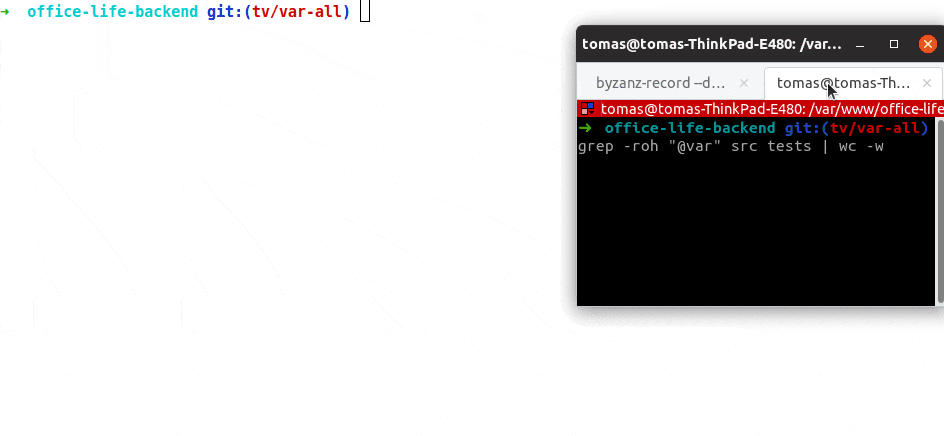Rector helps you with 2 areas - major code changes and in daily work.
- Do you have a legacy code base? Do you want to have that latest version of PHP or your favorite framework? → Rector gets you there with instant upgrade.
- Do you have code quality you need, but struggle to keep it with new developers in your team? Do you wish to have code-reviews for each member of your team, but don't have time for it? → Add Rector to you CI and let it fix your code for you. Get instant feedback after each commit.
It's a tool that we develop and share for free, so anyone can automate their refactoring.
Hire us to skip learning Rector, AST and nodes, to educate your team about Rectors benefits and to setup Rector in your project, so that you can enjoy the 300 % development speed 👍
Rector instantly upgrades and refactors the PHP code of your application. It supports all versions of PHP from 5.2 and major open-source projects:
- Complete 2800
@vartypes in 2 minutes - Upgrade 30 000 unit tests from PHPUnit 6 to 9 in 2 weeks
- Complete PHP 7.4 property type declarations
- Migrate your project from Nette to Symfony
- Refactor Laravel Facades to Dependency Injection
- And much more...
- How To Run Rector on Changed Files Only
- How to Ignore Rule or Paths
- How to Configure Rule
- How To Work with Doc Block and Comments
- How run Rector in Docker
- How to Add Test for Rector Rule
- How to Create New Rector Rule
- How to Generate New Rector Rule with Recipe
composer require rector/rector --dev- Having conflicts during
composer require? → Use the Rector Prefixed - Using a different PHP version than Rector supports? → Use the Docker image
There a 2 main ways to use Rector:
- a single rule, to have the change under control - you can choose from over 600 rules
- or group of rules called sets - pick from sets
To use them, create a rector.php in your root directory:
vendor/bin/rector initAnd modify it:
// rector.php
use Rector\Core\Configuration\Option;
use Rector\Php74\Rector\Property\TypedPropertyRector;
use Rector\Set\ValueObject\SetList;
use Symfony\Component\DependencyInjection\Loader\Configurator\ContainerConfigurator;
return static function (ContainerConfigurator $containerConfigurator): void {
// here we can define, what sets of rules will be applied
$parameters = $containerConfigurator->parameters();
$parameters->set(Option::SETS, [SetList::CODE_QUALITY]);
// register single rule
$services = $containerConfigurator->services();
$services->set(TypedPropertyRector::class);
};Then dry run Rector:
vendor/bin/rector process src --dry-runRector will show you diff of files that it would change. To make the changes, drop --dry-run:
vendor/bin/rector process srcNote: rector.php is loaded by default. For different location, use --config option.
// rector.php
use Rector\Core\Configuration\Option;
use Rector\Core\ValueObject\PhpVersion;
use Symfony\Component\DependencyInjection\Loader\Configurator\ContainerConfigurator;
return static function (ContainerConfigurator $containerConfigurator): void {
$parameters = $containerConfigurator->parameters();
// paths to refactor; solid alternative to CLI arguments
$parameters->set(Option::PATHS, [__DIR__ . '/src', __DIR__ . '/tests']);
// Rector relies on autoload setup of your project; Composer autoload is included by default; to add more:
$parameters->set(Option::AUTOLOAD_PATHS, [
// autoload specific file
__DIR__ . '/vendor/squizlabs/php_codesniffer/autoload.php',
// or full directory
__DIR__ . '/vendor/project-without-composer',
]);
// is your PHP version different from the one your refactor to? [default: your PHP version], uses PHP_VERSION_ID format
$parameters->set(Option::PHP_VERSION_FEATURES, PhpVersion::PHP_72);
// auto import fully qualified class names? [default: false]
$parameters->set(Option::AUTO_IMPORT_NAMES, true);
// skip root namespace classes, like \DateTime or \Exception [default: true]
$parameters->set(Option::IMPORT_SHORT_CLASSES, false);
// skip classes used in PHP DocBlocks, like in /** @var \Some\Class */ [default: true]
$parameters->set(Option::IMPORT_DOC_BLOCKS, false);
// Run Rector only on changed files
$parameters->set(Option::ENABLE_CACHE, true);
// Path to phpstan with extensions, that PHPSTan in Rector uses to determine types
$parameters->set(Option::PHPSTAN_FOR_RECTOR_PATH, getcwd() . '/phpstan-for-config.neon');
};To work with some Symfony rules, you now need to link your container XML file
// rector.php
use Rector\Core\Configuration\Option;
use Symfony\Component\DependencyInjection\Loader\Configurator\ContainerConfigurator;
return static function (ContainerConfigurator $containerConfigurator): void {
$parameters = $containerConfigurator->parameters();
$parameters->set(
Option::SYMFONY_CONTAINER_XML_PATH_PARAMETER,
__DIR__ . '/var/cache/dev/AppKernelDevDebugContainer.xml'
);
};You can use --debug option, that will print nested exceptions output:
vendor/bin/rector process src/Controller --dry-run --debugOr with Xdebug:
- Make sure Xdebug is installed and configured
- Add
--xdebugoption when running Rector
vendor/bin/rector process src/Controller --dry-run --xdebugTo assist with echo-style debugging rector provides a rd() helper method which is usefull to pretty-print AST-nodes:
/**
* @param Class_ $node
*/
public function refactor(Node $node): ?Node
{
rd($node);
die;
}Do you use Rector to upgrade your code? Add it here:
Rector uses nikic/php-parser, built on technology called an abstract syntax tree (AST). An AST doesn't know about spaces and when written to a file it produces poorly formatted code in both PHP and docblock annotations. That's why your project needs to have a coding standard tool and a set of formatting rules, so it can make Rector's output code nice and shiny again.
We're using ECS with this setup.







